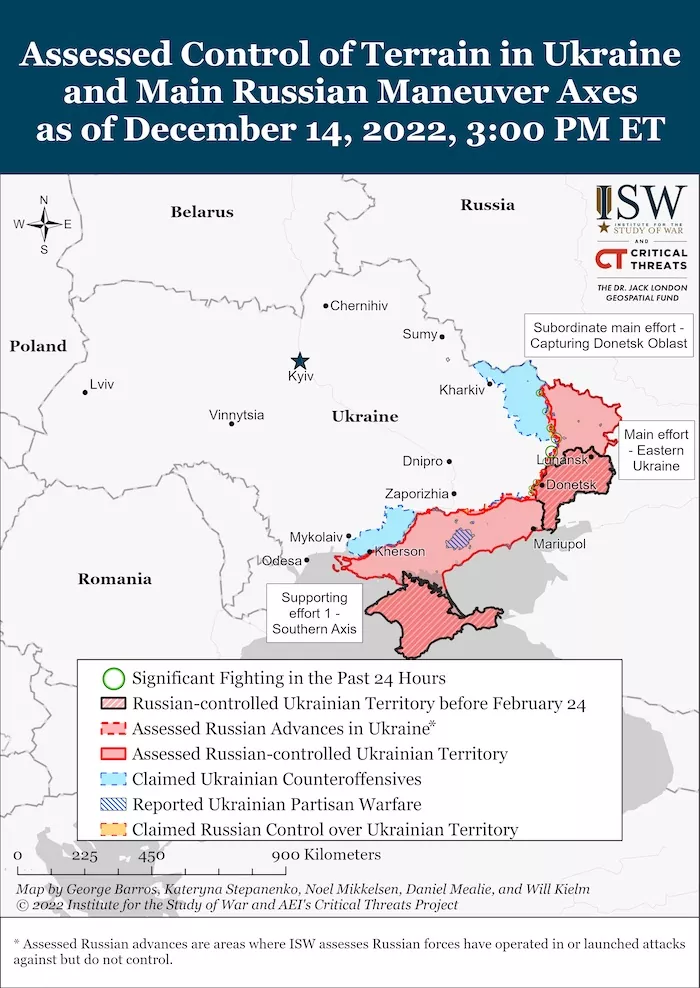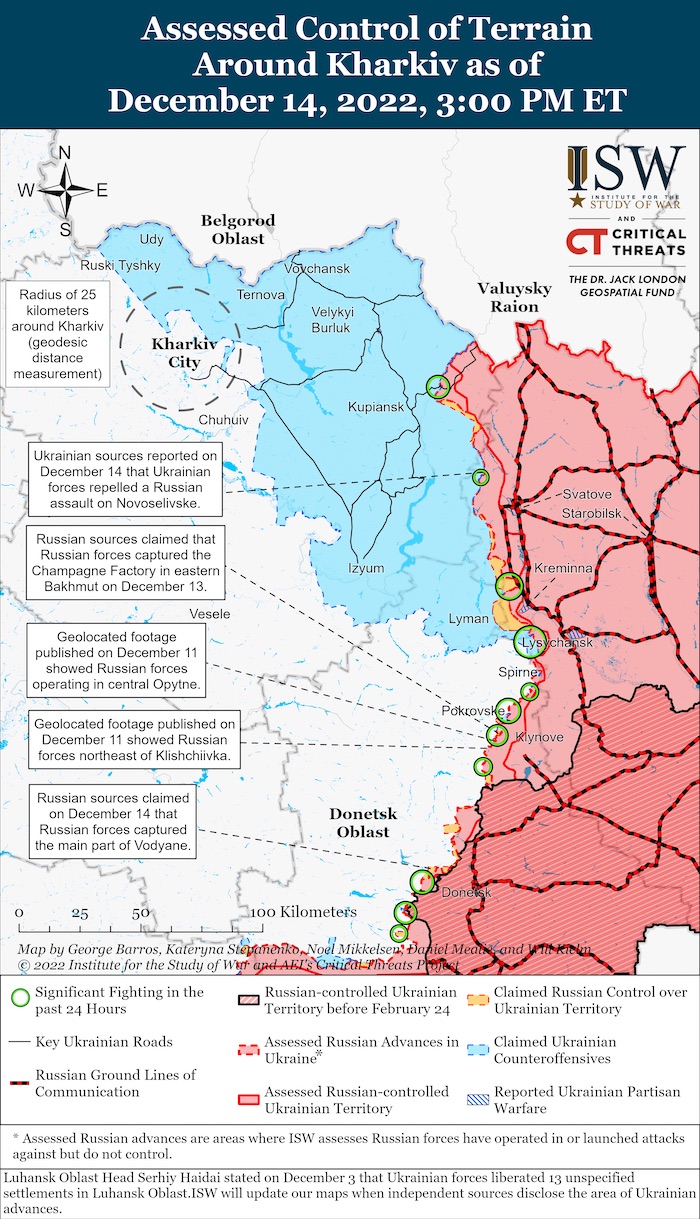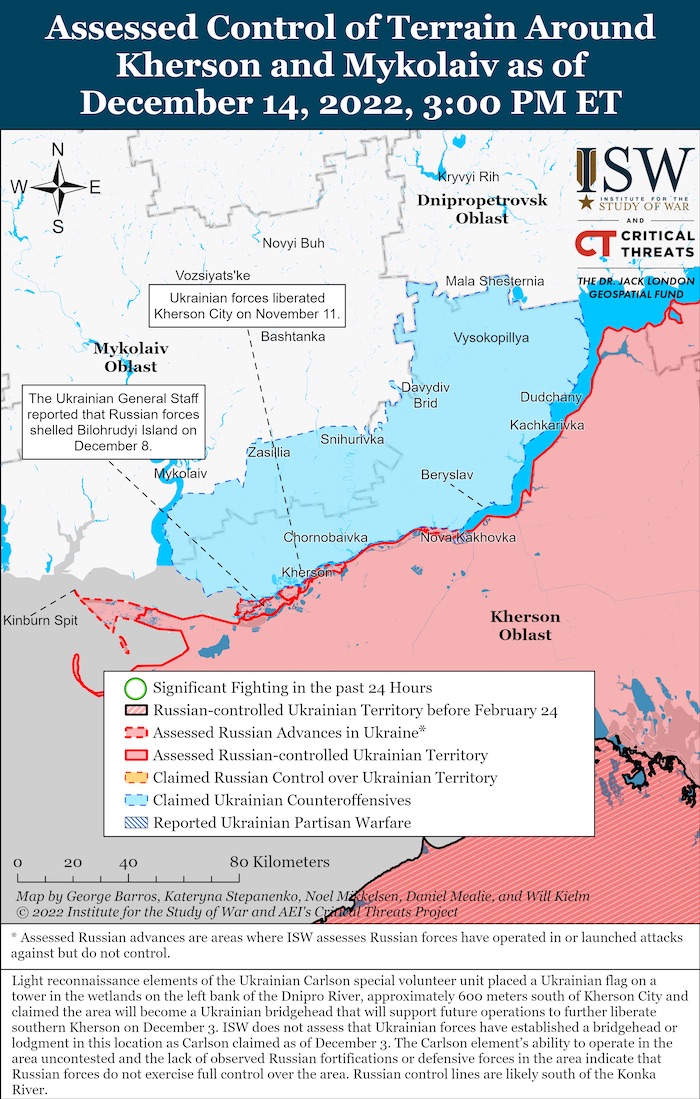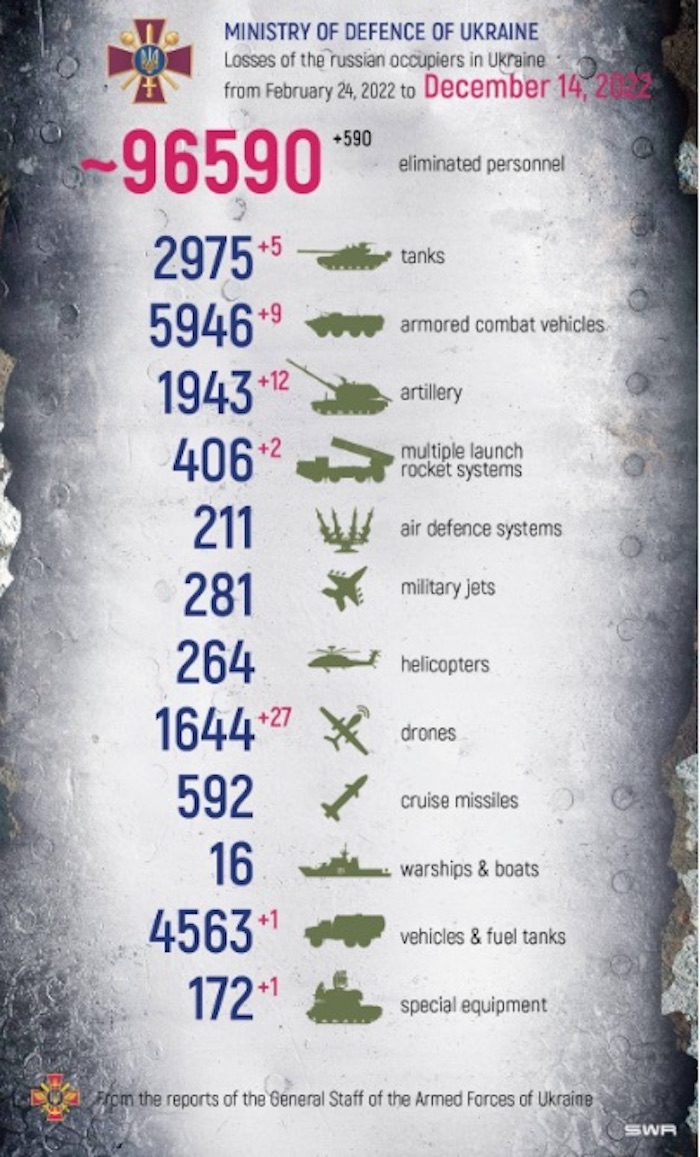Daily overview — Summary report, December 15
The General Staff’s operational update regarding the Russian invasion as of 06.00 am, December 15, 2022 is in the dropdown menu below:




Military Updates
Next major phase of war and Ukraine’s offensive in the south expected to be in & around strategically vital city of Melitopol
Using missiles, saboteurs, Ukraine is focusing on Melitopol, vital Russian link to Crimea, ahead of expected southern offensive https://t.co/nk5lJ7gO3S
— Euromaidan Press (@EuromaidanPress) December 14, 2022
According to British Defence Intelligence, (last 48 hours):
On 13 December 2022, Belarus carried out a snap combat readiness inspection of its forces. The exercises are reportedly taking place in the north-west of the country, away from the Ukrainian border. In addition, Russia has recently deployed extra units of mobilised reservists to Belarus.
Belarus played a key enabling role in Russia’s assault towards Kyiv from 24 February 2022. However, the exercising Belarusian troops and Russian units are currently unlikely to constitute a force capable of conducting a successful new assault into northern Ukraine.
Losses of the Russian army

Humanitarian
64 Ukrainian servicemen and 1 American civilian were released from Russian captivity. An American citizen Suedi Murekezi was released from Russian captivity. He was taken prisoner in June 2022 by Russian occupiers in Kherson where he helped locals. Russians claimed he was participating in Ukrainian rallies during the occupation.
Russians shelled Kherson Oblast 42 times, killing one person. One person died and one was injured as a result of Russian shelling in Kherson Oblast on December 13, Kherson Oblast Head Yaroslav Yanushevych reports. The Russian military targeted the yacht club, school, sports facility, and private and apartment residential buildings.
https://twitter.com/EuromaidanPress/status/1603402951682363397
Legal
Ukraine’s high anti-corruption court confiscated all property of the ex-president Yanukovych. The reason for the confiscation is that Yanukovych facilitated the Russian Federation in carrying out subversive and terrorist activities against Ukraine and waging an aggressive war. Among other things, he publicly addressed President Zelenskyy with letters about ending the war by accepting the conditions of the aggressor country. The court ruling ends the 8-year-long investigation.
Ukraine’s court arrested seven luxury hotels as Ukraine continues seizing Russia’s and oligarchs’ property. The Pechersk District Court of Kyiv partially satisfied the request of the Prosecutor General’s Office and imposed an arrest with a prohibition of alienation on the hotels owned by the VS Energy group, which, according to the investigation, is controlled by Russian citizens Oleksandr Babakov, Yevgeny Giner and Mykhailo Voevodin.
Ukrainian police find the property of Russian deputy in Kyiv. Ukrainian National Police has reported it found the deputy of the Russian State Duma owned 11 apartments in Kyiv. Before the full-scale invasion, the lawmaker voted for the decision to deploy Russian troops to Ukraine. He also was awarded medals for “courage” and “the liberation of Mariupol” by Denis Pushylin, the head of an illegal entity Donetsk People’s Republic in eastern Ukraine.
#Russia invaders abduct #Melitopol lecturer in new wave of terror after #Ukraine damages important bridge #Zaporizhzhia #LetMyPeopleGo #StandWithUkraine #RussiaWarCrimes #StopRussiahttps://t.co/4BvfOdxBeQ pic.twitter.com/KqMRDG4gkO
— Halya Coynash (@halyapuff) December 14, 2022
Support
https://twitter.com/EuromaidanPress/status/1603027035978358786
Zelenskyy urged New Zealand to take leadership in diplomacy to address environmental damage in Ukraine. Ukrainian President Volodymyr Zelenskyy said on Wednesday that the environmental harm from Russia’s war will affect millions of people for years and urged New Zealand to take leadership in diplomacy to address the damage, Reuters reports.
UK to train 90 Ukrainian judges to carry out war crimes trials for Russian soldiers. The first group of judges attended sessions at a secret location and more will follow in the coming months. Attorney General Victoria Prentis told Sky News it would ensure perpetrators of atrocities can – at an unprecedented scale – be prosecuted while the war goes on.
https://twitter.com/EuromaidanPress/status/1602975435079442432
New Developments
Despite the war, Ukrainian scouts brought the Peace Light of Bethlehem to the Ukrainian president as usual. Today, Ukrainian scouts brought the Peace Light of Bethlehem to the Ukrainian president as usual. They are also disseminating it throughout Ukraine to all churches as well as to the frontline units before Christmas.
The European Parliament awarded the 2022 Sakharov Prize for Freedom of Thought to the People of Ukraine. The Sakharov Prize “For Freedom of Thought” for 2022 was awarded “to the courageous people of Ukraine represented by the President, elected leaders, and civil society.” The ceremony was held in the European Parliament on 14 December, 2022.
https://twitter.com/EuromaidanPress/status/1603199662818615296
Assessment
- On the war.
The Institute for the Study of War has made the following assessment as of December 14, 2022:
Russian President Vladimir Putin’s alluded decision to postpone his annual address to the Russian Federation Assembly indicates he remains uncertain of his ability to shape the Russian information space amidst increasing criticism of his conduct of the invasion of Ukraine. The Presidential Address to the Federal Assembly to the Russian State Duma and Federation Council is an annual speech introduced to the Russian constitution in February 1994, roughly equivalent to the US President’s annual State of the Union address.Kremlin Spokesperson Dmitry Peskov stated that Putin may deliver his address to the Federation Assembly in 2023 and called on Russians to stop "fortune-telling with coffee grounds" regarding the timing of the next address.[1] An unnamed government source told the Russian state newswire TASS that the countdown for the new address starts from the date of the previous address, noting that the address is unlikely to take place in 2022.[2] Putin held his last address in late April 2021, discussing his initiatives for the year following the first crisis he caused with the Russian military buildup on the Ukrainian border in early 2021.[3]
The Russian withdrawal from Kyiv Oblast and northern Ukraine in April 2022 likely spoiled Putin’s plans to declare victory during the Federation Assembly address. Putin had previously seized the opportunity inMarch 2014 to deliver the "Crimean Speech," wherein he announced the illegal annexation of Crimea and the city of Sevastopol.[4] Putin likely anticipated a similar outcome in early spring only to indefinitely postpone the address, likely as a result of Russian military failures, his announced annexation of territories Russian forces did not control, and public dissatisfaction with mobilization. Putin may be still waiting and hoping to deliver a grandiose victory speech in 2023 or postponing the moment when he will have to admit that Russia cannot achieve his frequently restated maximalist aims in Ukraine.
Putin may not be confident in his ability to justify the cost of his war upon Russian domestic and global affairs when addressing the Russian public and elites. The unnamed TASS source noted that the address requires significant preparation by the president and his staff as it normally addresses plans for all aspects of Russian society—economy, education, military, global partnerships, etc. A victory in Ukraine could have allowed Putin to obfuscate Russian human and financial losses as it did in 2014, but Russia has not had any significant victories since the Russian occupation of Lysychansk in early July. Putin had previously attempted to sell the annexation of partially occupied Kherson, Zaporizhzhia, Donetsk, and Luhansk oblasts on September 30 as a major victory, only to reportedly generate further grumbling among Russian elites and undermine state propaganda narratives.[5] Putin’s most recent appearances on December 7 and December 9 offered vague responses to a few concerns over the length of the war, a second mobilization wave, and a claimed Ukrainian threat to Russian territory but also generated some criticism and confusion within the Russian pro-war community.[6] The Russian withdrawal from Kherson City had also angered prominent nationalist ideologists who had begun to question Putin’s commitment and ability to establish "Greater Russia."[7]
Putin has already canceled his annual press conference with the members of the Russian public, likely in an attempt to avoid answering questions about Russia’s military failures without resorting to excessively obvious manipulation of questioners and questions. Peskov announced on December 12 that Putin will not hold his live press conference with Russians, which he had been hosting for ten years.[8] Putin appears to be increasingly turning to scripted and pre-recorded appearances such as his meeting with 18 hand-picked, politically affluent women on November 25 who falsely introduced themselves as mothers of mobilized servicemen.[9] Putin is likely attempting to preempt the risks associated with having to respond to a complex question. The cancellation of the press conference, however, may undermine Putin’s populist appeal as a ruler in touch with his population.
Ukrainian officials are forecasting that Russia may attempt to launch a large-scale offensive in the early months of 2023. Ukrainian Foreign Minister Dmytro Kuleba stated on December 13 that indicators such as Russian mobilization efforts, the announcement of conscription, and the movement of heavy weaponry suggest that Russia may be preparing for a large-scale offensive in January and February 2023.[10] Kuleba’s statement is consistent with ISW’s long-standing assessment that the winter months will increase the pace of operations on both sides and that conditions on the ground throughout Ukraine will likely be conducive to offensive operations.[11]
Russian forces could most readily relaunch offensive operations along two main axes of advance in the coming months—along the Kharkiv-Luhansk border in northeastern Ukraine, or in Donetsk Oblast. Russian troops appear to be moving heavy equipment from rear areas in Luhansk Oblast to areas near the current frontline along the Kharkiv-Luhansk Oblast border and have reshaped and reconsolidated their force grouping along this line, as ISW has recently reported.[12] Ukrainian and Russian sources have recently reported that Russian troops are conducting limited offensive operations along this line, particularly to regain lost positions west of Kreminna.[13] A recent drop in temperatures in this area to consistently below-freezing has allowed the ground to solidify, likely setting conditions for increasing the pace of offensive operations.
Russian combat power that was freed up following the withdrawal from the west (right) bank of Kherson Oblast has redeployed to various areas in Donbas, reinforced by mobilized reservists. Russian forces may additionally hope to launch an offensive in western Donetsk Oblast to build on marginal advances made in the Vuhledar-Pavlivka area in November.[14] ISW continues to assess that Russian forces seek to complete the capture of the entirety of Donetsk Oblast, and potential future offensives in western Donetsk Oblast may be intended to complement ongoing offensive drives on the western outskirts of Donetsk City and around Bakhmut to accomplish this wider territorial objective. However, despite the potential for new offensive operations, ISW continues to assess that Russian combat capability remains degraded and that Russian troops are highly unlikely to be able to take strategically-significant territory in the coming months.
Ukrainian air defense units shot down all the Shahed drones that Russian forces launched at Ukraine on December 14. Ukrainian military sources reported that Russian forces launched 13 Shahed-136 and Shahed-131 drones at critical infrastructure facilities in Ukraine, including areas of Kyiv Oblast, and that Ukrainian air defense forces shot down all the drones.[15]
Ukrainian sources reported that 64 Ukrainian prisoners of war (POWs), including one American civilian, returned to Ukraine on December 14.[16]The Ukrainian Ministry of Reintegration announced the exchange but did not specify how many Russian soldiers were part of the deal.[17] The Russian Ministry of Defense (MoD) notably has not commented on the exchange as of the time of this publication, which may draw criticism from prominent voices in the Russian milblogger information space who have called for increased transparency from the Russian MoD in its handling of prisoner exchanges.[18]
The Kremlin will likely intensify existing information operations accusing Ukraine’s government of oppressing religious liberty in Ukraine. Prominent Pro-Russian Telegram Channel Readovka made a post to its 1.5 million subscribers claiming that Ukraine’s State Security Service (SBU) raided Russian Orthodox churches in nine Ukrainian oblasts and accusing the SBU of conducting arbitrary "terror" searches to detain Russian Orthodox clergy on December 14.[19] This narrative contains elements of several observed Russian information operations designed to falsely portray Ukraine as oppressing Russian religious minorities.
Ukraine is not attacking religious liberty or Eastern Orthodoxy. Ukrainian President Volodymyr Zelensky signed a decree to impose personal sanctions against representatives of religious organizations associated with the Russian government on December 2.[20] This decree targets Kremlin-linked elements of the Ukrainian Orthodox Church Moscow Patriarchate (UOC MP). The UOC MP is not an independent religious organization. The UOC MP is the Kremlin-controlled Russian Orthodox Church’s subordinate branch in Ukraine.[21] The UOC MP materially supported Russia’s annexation of Crimea and the invasion of Eastern Ukraine in 2014 and continues to support Russia’s current invasion.[22] Ukrainian authorities convicted a Moscow Patriarchate priest in Sievierodonetsk, Luhansk Oblast, for providing information about Ukrainian forces to Russian forces since April 2022, for example.[23]
The UOC MP is not the Ukrainian Orthodox Church, despite some inaccurate Western reporting characterizing it as "the Ukrainian Orthodox Church."[24] The Ukrainian Orthodox Church is a separate entity that gained autocephaly (official independence) from the Moscow Patriarchate in 2019.[25] The UOC MP is a small element within Ukraine’s religious demography. Multiple surveys conducted in 2022 found that only four percent of Ukrainians identify as members of the Moscow Patriarchate, whereas over 50 percent of Ukrainians identify as members of the Ukrainian Orthodox Church.[26] More than double of the UOC MP’s current adherents identified as Greek Catholics (8.8 percent) in 2021.[27]
The Kremlin will likely intensify information operations accusing Ukraine of attacking freedom of the press within the next three months. Ukraine’s parliament passed a media law on December 13 to satisfy a European Union membership prerequisite.[28] This law expands the powers of Ukrainian state censors over media organizations—including online media, forbids spreading Russian propaganda or information that disparages the Ukrainian language or defends the Soviet regime that ruled from 1917-1991, and establishes regulatory ratios for Ukrainian-language content versus Russian-language content on radio stations. These policies do not outlaw Russian-language media or the use of the Russian language in Ukraine but take steps to preserve the use of the Ukrainian language against the Kremlin’s campaign of cultural genocide that seeks to eradicate the notion of a unique Ukrainian cultural identity.[29] The Kremlin intensified information operations that Ukraine attacked freedom of the press in early 2021 after Ukraine banned three prominent pro-Russian television channels linked to key Putin ally Viktor Medvedchuk.[30] Ukraine’s new media law will enter into force three months after its ratification.[31]
Key Takeaways
- Russian President Vladimir Putin reportedly postponed his annual address to the Russian Federal Assembly, indicating that the Kremlin is not confident that it can continue to shape the Russian information space.
- Ukrainian officials are forecasting that Russian forces may attempt to launch a large-scale offensive at the beginning of 2023.
- Ukrainian air defenses shot down all drones that Russian forces launched in attacks on December 14.
- Ukrainian sources reported that 64 POWs returned to Ukrainian-held territory.
- The Kremlin will likely intensify information operations aimed at presenting the Ukrainian government as oppressing religious liberties and freedom of the press.
- Ukrainian forces continued counteroffensive operations and Russian forces conducted counterattacks in the Svatove and Kreminna areas.
- Russian forces continued offensive operations in the Bakhmut and Avdiivka areas.
- Russian forces continued defensive operations south of the Dnipro River in Kherson Oblast.
- Kremlin officials admitted to receiving complaints about mobilization despite mobilization’s "de facto end."
- Ukrainian partisans continue to aid Ukrainian forces in identifying valuable Russian targets.





